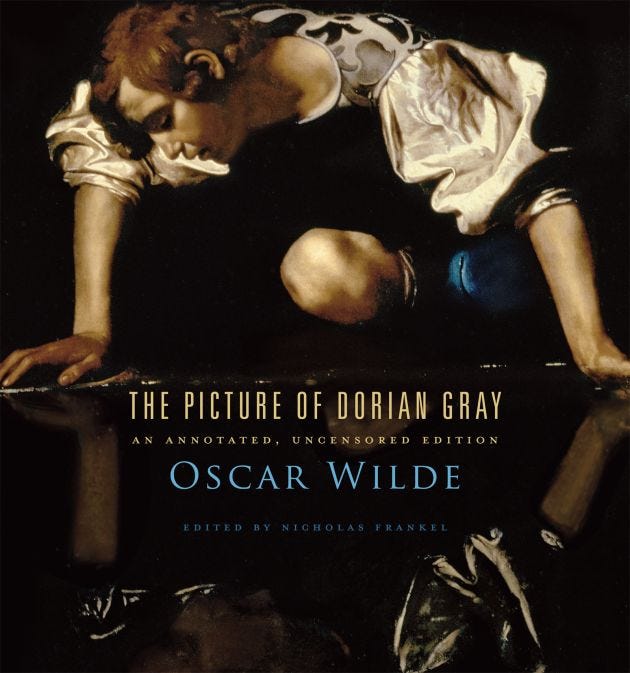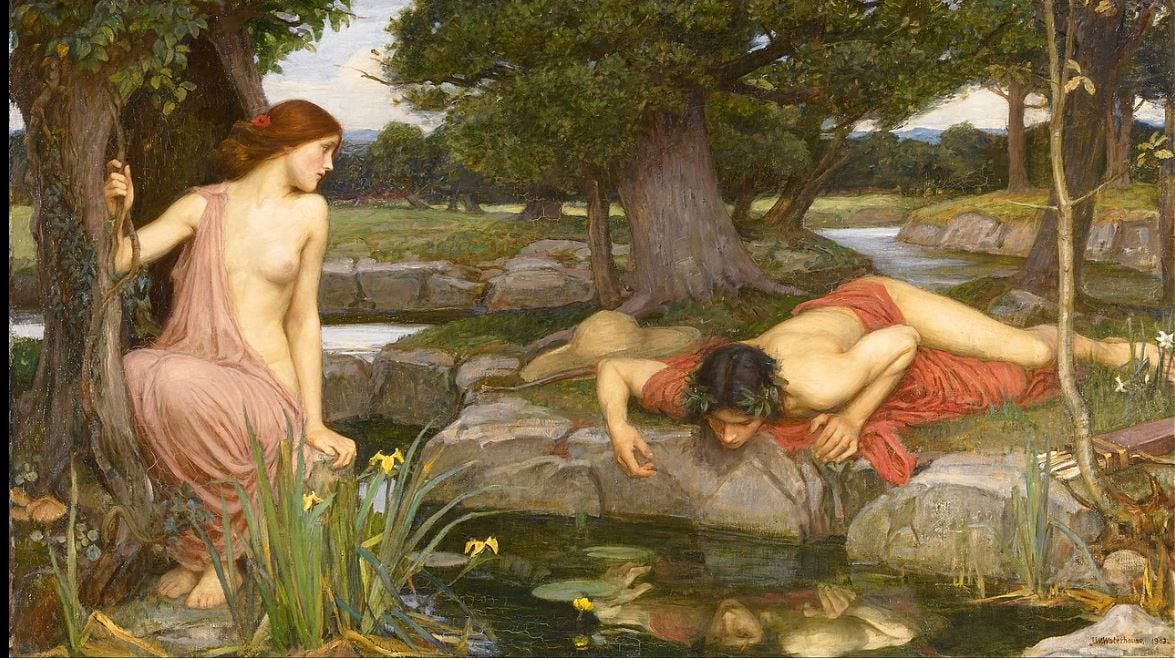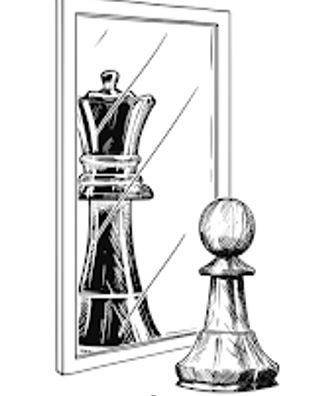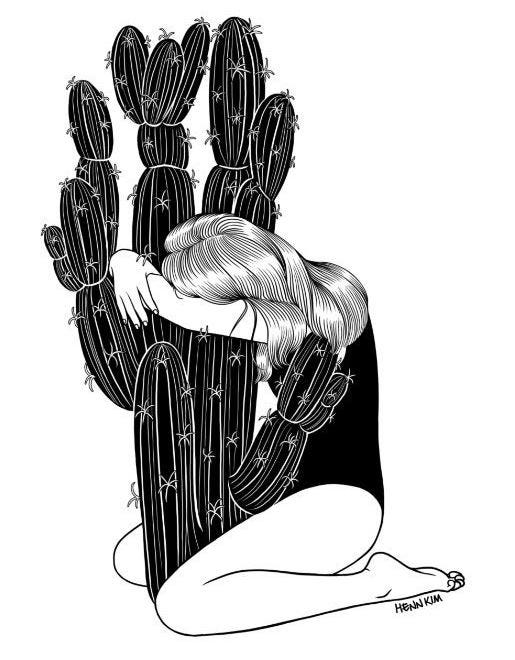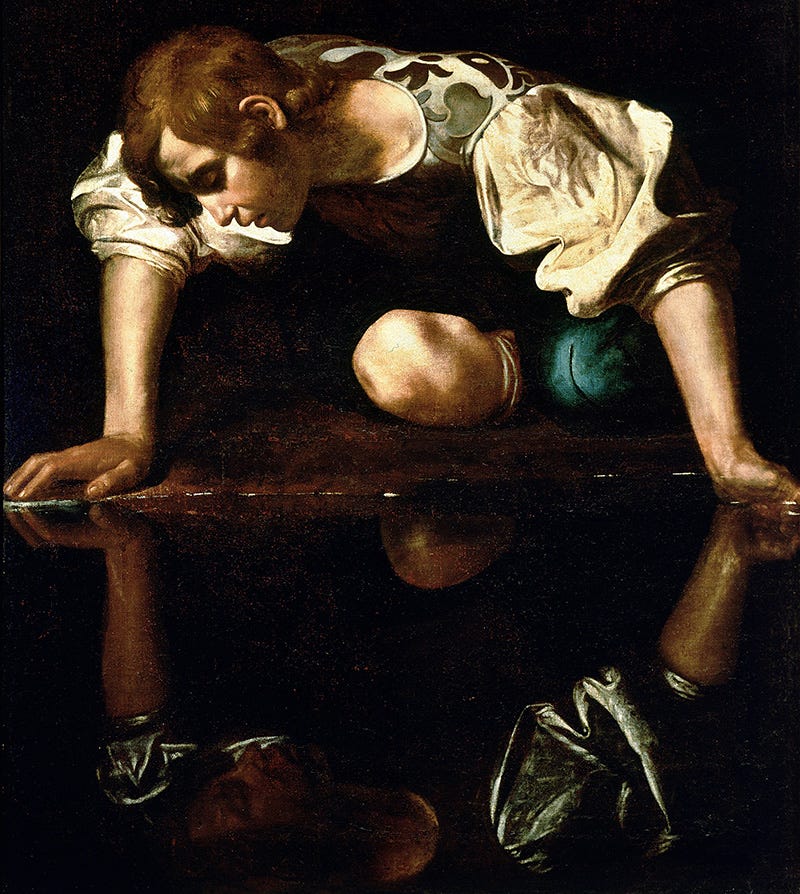NARC's meltdown from relentless ECHOing
Recovering some forgotten bits to the NARCISSUS myth of sexless beauty, yearning and longing
In this essay I want to explore the linguistic use and meaning of the word ‘narcissist’.
Narcissus was- according to the original Greek myth --a youth of extraordinary beauty who couldn’t love others and broke the hearts of many lovers, male and female.. .some variations of the myth stress the vanity of Narcissus as central to the storyline- that is to say he was so vain that he fell in love with his own reflection in a pool of water. He eventually died of starvation, and where he died, a narcissus flower grew.
Other variations of the myth emphasize the torture and suffering of Narcissus for not being able to consume love, being condemned to a sexless life- which eventually is recognised by the gods who immortalised him as the narcissus (daffodil) flower.
The theme of Narcissus is a recurrent one in literature and film..Just think of the parallels to Oscar Wilde’s ‘picture of Dorian Gray’- the youth who fell in love with his image and dreaded growing old… ( a short summary albeit in different context can be found here https://canadianpatriot.org/2024/08/08/peter-nygard-transhumanism-perversion-eugenics-human-cattle/ )
Some people believe that the narcissus flower was created from Narcissus's tears containing the essence of his vanity and that the NARC issus myth is a coded message of a ‘narcotic’ experience. ( the flower named after him is almost certainly not a narcotic).
BELOW: J Waterhouse painting, excerpt from ‘Echo and Narcissus’ 1905
Like all myth it underwent several permutations and alterations, being retold and passed on many times over the years,- first in the thousand years between the original Greek myth and Ovid using it as one of many stories in his Metamorphoses book--and subsequent translations and retelling.
Ovid wrote the METAMORPHOSES in an attempt to trace the origins of the world and its development up to his own time (Caesar Augustus’s reign in the Roman Empire, 8CE)
Today the term ‘Narcissus’ is mostly used in a derogatory way to describe a self centred personality who needs and seeks attention and admiration, lacks the ability to understand or care about the feelings of others – implying emotional immaturity. Behind the mask of confidence, the narcissist is not sure of their self-worth and easily upset by the slightest criticism.
Below: David Revoy: Echo and Narcissus
There is a lot of negative connotation packed into our common use of ‘Narcissism’: Enough for a curious mind to suspect that there might be something else? Anything that bad must have some value in it !
Our common intolerance towards narcissism in others is possibly a signal that this area might hold something of importance or interest. In this sense narcissism is a shadow quality in the Jungian sense. (ie seeing something in others we don’t like in ourselves).
Mainstream psychology on one hand emphasises the need for a strong ego and assertive and articulate personality. But narcissism oversteps the mark. Narcissists are unbalanced. They live and survive on manipulating others – successfully – for a short while – until found out..
Narcissists are no good hypnotists for the same reason they are no sex gods: their DNA is hardly present in the alligator pool of human evolutionary history.
I was curious to find out more because the common use of ‘Narcissist’ appeared to me as too flat, too one dimensional,- lacking dimension and depth.
Herman Hesse in his book ‘Narcissus and Goldmund’ contrasts the extroverted youthful Goldmund (‘golden mouth’ in German) with his serious teacher Narcissus, a young man of keen perception and analytical thinking.
The book explores the contrasts between the sensual, erotic character of Goldmund’s spontaneity and vitality and the scholarly orderliness and high minded rationalism of Narcissus.
Having read up on the various Greek and Roman stories linked to Narcissus I can suggest a few aspects that add depth and new perspectives to it.
For a start there is Echo. The myth is often titled: ‘Echo and the Narcissist’
Echo appears in two different myths in Ovid’s work-, one with Hera and one with Narcissus.
The first—preceding the Narcissus myth- is significant for Echo as it illuminates her link to the womanising big boss God –dominant father figure?- Zeus in Greek mythology (= Jupiter in Roman mythology).
Echo’s job was to prevent Zeus’ wife Hera (Juno in Roman mythology) finding out about his womanising escapades.
Narcissus is in many ways the opposite- the antithesis to Zeus.
The Roman author Ovid describes, a potentially significant event, when Jupiter (=Zeus in Greek mythology) and Queen Juno (=HERA in Greek mythology) argue about who enjoys sex more: men or women?
To settle their dispute, they decide to ask Teiresias, (sometimes also referred to as Tiresias--the future clairvoyant and oracle),- a man who had lived as both a male and a female- and so should know.
When Jupiter and Juno ask Teiresias whether men or women enjoy sex more, Teiresias says that women do.
Resenting this verdict, Juno curses Teiresias with blindness.
(Why did Hera/Juno resent Teiresias’ answer? Does Teiresias’ answer suggest that men and women generally do not understand what the other wants? That would chime with the stressful marriage of Hera (Juno) and the philandering Godfather Zeus /Jupiter..)
Jupiter however, tries to soften the curse his wife had put on Teiresias and gives Teiresias the gift of being able to see the future. Thus Tiresias becomes the clairvoyant, the seer, the oracle.
This is the Teiriesias who In the Narcissus myth of Ovid, becomes a famous prophet. One day, a sea nymph who has just given birth to an unusually beautiful baby, was afraid one of the immortal Gods would envy her son’s beauty and destroy him.
So she asks Teiresias if her son Narcissus will live to an old age. Teiresias shook his head and replies that 'The gods pose him no threat. Narcissus will have a long life, unless he learns to know himself’.
Narcissus grows up to be very handsome. Boys and girls desire him, but he is not able to give himself to any of them. He wears a certain aura, a glassy pride that keeps his suitors at a distance. He is the high minded loner. Many nymphs and girls fell in love with him but he rejected them.
Back to Echo-- : Zeus carried on with his usual pursuits: chasing, kissing nymphs, goddesses, travelling to the earth in disguise, pursuing women. He barely bothered to hide his misbehaviour from his wife.
If ever Zeus' wife Hera came too close to catching Zeus in the act, it was Echo’s job to distract her with an endless stream of pointless prattle until Zeus had finished and made his escape.
They played this trick once too often. Zeus' wife Hera saw through it, confronted Echo and put a curse on her:
‘You always want to have the last word. From now on you shall have nothing else but the last words someone speaks. Nothing else'
Echo opened her mouth to answer but all she could do was repeat the last few words spoken: 'Nothing else. Nothing else. Nothing else.'
From then on she could not speak for herself. She was condemned to repeat the last few words spoken to her.
We don’t know how Echo felt about the unrestrained vitality of Zeus thereafter- that is after Hera had put the spell on her and she had- presumably left Zeus’ employ. Or if that was relevant to her being attracted to Narcissus later.
It is perfectly plausible that the serenity of Narcissus epitomised a certain counterpoint to the unbridled vitality of Zeus/Jupiter.
According to the myth she left Zeus and went to the earth. By chance she saw Narcissus. She fell in love with him. For months she followed him, waiting for the words to come and an opportunity to proclaim her love. At last, the opportunity came when Narcissus got separated from his friends while hunting in a forest. Narcissus called, 'Is anybody here?'
Echo repeated joyfully the last word: 'Here!'
'Then come to me, lets meet here!’
‘Meet here’ she repeats.
She ran to him. She put her arms around him. He pushed her away.
'Get off me! What are you? I suppose like all the others you love me.'
Love me,' she said 'Love me.'
'I would rather die' said Narcissus 'than let you lie with me.'
'Lie with me,' she said 'Lie with me.'
'Leave me alone.' He fled.
'Alone,' said Echo 'Alone. Alone.'
Echo was hurt, and died soon. Only her voice survived, hiding in caves, and high hills.
This exchange indicates that his self absorption allows no connections of the heart. The echoing aspect of narcissism – the feeling that everything in the world is only a reflection –an echo- of oneself- doesn’t want to give up power. But it is a close and significant encounter nevertheless- and depending how you read it, might contain hints of his reckoning being near.
It is the chosen protective security of his high minded isolation, the ‘prison of his own making’ of the loner who lacks the confidence to face the full spectrum world unfiltered.
In a paradox way the insistent self centred focus is a sign that he can’t find a way to adequately love, respect and value himself. It is complicated. Even though he pushed Echo away, for me that dialogue shows that his meltdown is near.
In the social narcissism of modern society, we often dismiss the soul as a nuisance in order to focus on the objective of our efforts. In that way all the highly focused achievers have at least traits of a narcissist in them. Below :excerpt from S. Dali’s Narcissus
.
In the myth as Ovid tells it- it is at this point – after he pushed Echo away - that the goddess of revenge, Nemesis hears Echo’s sights and prayers along the lines of ‘may he one day fall in love and not get what he loves’. Nemesis will ensure that Narcissus is soon to have a life changing, psychotically intense experience.
Weary of that stupid nymph Narcissus went to a pool to drink. It was a perfect pool, as smooth as any mirror. He leant over the side and saw a face of such beauty that suddenly he was filled with another kind of craving. He leant forward to kiss it but it broke into wrinkles. He gave a cry of anguish. He lay beside the pool like a fallen statue. The architecture of his personality starts to crumble.
He was transfixed by the image. Time and again he tried to capture it..
And so the prophecy of Tiresias was fulfilled. Narcissus had learned to know himself, and his awful torture, his meltdown began. No thought of food or drink would take him from the spot. There is no doubt about the intensity of his emotional suffering at this moment.
He talks to the trees, asking ’has anyone ever had as much longing as I have?’
Below: yearning, longing, ambition- the mirror
Here is an element of the visionary, however unarticulated: transforming narcissism through the intense overwhelming desire to be the person we newly imagine ourselves to be or to accomplish a certain design of the world.
Some commentators go as far as seeing narcissist traits in America- a nation built on the desire to be the NEW WORLD- a moral beacon to the rest-while painfully aware of the gap between reality and that image.. insisting on the exceptionality of its existence.
In one version of the myth it was Echo’s face he saw in the water..
At last he said, 'You, please, come to me. Lie with me. Love me. When I laugh I see you laugh. When I smile you smile. When I cry you shed tears. You give me every indication that you love me and yet we do not embrace. I think I understand: I am in love with myself. Always we will be together and yet always we will be apart. I have loved you in vain.'
Echo repeated the words: 'I have loved you in vain. I have loved you in vain.' This is the end of his journey, his final showdown, his homecoming: he has come to know himself: ‘I have loved you in vain’
Narcissus closed his eyes and lay his head upon the ground. His soul drifted out of his open mouth beneath the crust of earth, down a steep flight of stairs, into the underworld, into the land of many guests, the realm of the dead.
As his soul drifted across the River of Forgetfulness it left behind all memory. Even though some urge too powerful to resist drew him to the edge of the river, where it leant over the side and stared at the reflection on the water.
Soon the rumours reached the village: lovely Narcissus was dead. So the people searched the forest to burn the corpse with proper honours. But they never found a body. Instead they came upon a delicate flower with white and yellow petals leaning over the edge of a pool as if gazing at its own reflection. The narcissus flower.
Loneliness, betrayal, and the inability to trust others can all be central parts of narcissism.
Narcissists often have a deep-seated fear of abandonment, rejection and betrayal, and they may use their narcissistic behaviours as a way to protect themselves from these feelings.
They may have experienced significant betrayal, neglect or helplessness in their childhood, which can lead to difficulty trusting others and a sense of loneliness. As a result, Narcissists often feel lonely and isolated, even when they are surrounded by people. This is because they have difficulty opening up and connecting with others on a hearty level. Betrayal: Narcissists often have a fear of betrayal, which can be traced back to childhood experiences or even pre birth toxic periods in the mother’s womb. . If they felt ‘betrayed’ by a parent or caregiver, they may learn to expect that others will also betray them. This fear of betrayal can lead them to become controlling and manipulative, and never giving themselves completely into a relationship to avoid being betrayed or hurt again.
Narcissists often have difficulty trusting others. They may believe that others have ulterior motives or that no one can truly understand them. This can make it difficult for them to form close relationships, and it can also lead to feelings of loneliness and isolation
The myth of Narcissus in Ovid's Metamorphoses also suggests that Narcissus was deeply unhappy with himself. Perhaps he had experienced dark sides of human nature when too young- perhaps there was something he was ashamed of. Something in the past so unspeakable awful that he rather remains an observer than a player/ participant of life. That he refused to interact with anyone, and he eventually died of starvation and thirst while gazing at his reflection in a pool of water.
This suggests that narcissism can be a complex phenomenon. It can involve both love and hate for the self.
Anybody can see that the narcissist is unsuccessful with his type of self centred focus as a method to achieve self acceptance..
Anybody who constantly needs to talk about himself must not have a very strong sense of self. Narcissists may be obsessed with their own. Their self love is in the wrong doses and not working to heal the wound however hard s/he tries – the narcissists remains deeply insecure and dissatisfied with themselves. They may crave attention and admiration, but they may also be afraid of rejection and abandonment.
Apparently there are more men than women classed as narcissists.
There are a number of psychologists who have written about the different aspects of narcissism. Carl Jung, for example, believed that narcissism is a defense mechanism that develops in childhood when a child's needs for love and attention are not met. The child then becomes fixated on their own needs and desires, and they are unable to develop healthy relationships with others.
Heinz Kohut, on the other hand, believed that narcissism is a normal developmental stage that all children go through. However, if a child's needs for mirroring and idealization are not met, they may develop a narcissistic personality disorder. This disorder is characterized by a grandiose sense of self-importance, a need for constant admiration, and a lack of empathy for others.
He views narcissism at its core as a defect in the development of a healthy self. According to Kohut, the child’s self develops and gains maturity through interactions with others (primarily the mother) that provide the child with opportunities to gain approval and enhancement and to identify with perfect and omnipotent role models. Parents who are empathic contribute to the healthy development of the child’s self in two ways. First, they provide mirroring that fosters a more realistic sense of self. Second, parents reveal limitations in themselves that lead the child to internalize or assume an idealized image that is realistic and possible to attain. Problems are introduced when the parent is unempathetic and fails to provide approval and appropriate role models. According to Kohut, narcissism is in effect developmental arrest—a halt in the child’s development at what was a normal and necessary stage, with the result that the child’s self remains grandiose and unrealistic. At the same time, the child continues to idealize others to maintain self-esteem through association.
In contrast, Kernberg’s theory maintains that narcissism is a defense. It results from the child’s reaction to coldness and lack of empathy on the parents’ part, perhaps stemming from their own narcissism. According to Kernberg, the child becomes emotionally hungry and responds with rage to the parents’ neglect. In this view the narcissistic defense reflects the child’s attempt to take refuge in some aspect of the self that evokes admiration in others—a defense that ultimately results in a grandiose and inflated sense of self. Narcissists, in Kernberg’s view, are grandiose on the outside but vulnerable and questioning of their self-worth on the inside.
There are many painting that depict the myth of Narcissus. John William Waterhouse shows a young man gazing at his reflection in a pool of water. The water in the painting is calm and reflective, and it mirrors the boy's face perfectly. The boy is completely absorbed in his own reflection, and he seems to be unaware of the world around him.
The water in the painting can be interpreted in a number of ways. It can symbolize the boy's own self-absorption, or it can represent the pool of water where Narcissus eventually died. The water can also be seen as a symbol of the unconscious and unspecific longing. This golem like unshaped form gives the narcissist something liquid or watery. Narcissists are not on solid ground. Or thinking clearly or driven by fiery passion.
The fact that Narcissus' parents were water gods is also significant. In Greek mythology, water is often associated with beauty, purity, and fertility. Subconsciousness came much later.
The different interpretations of the myth of Narcissus and the different theories of narcissism suggest that this is a complex phenomenon with no easy answers. It is important to remember that narcissism is not just a personality trait, but also a defense mechanism that can develop in response to childhood trauma or neglect. This complexity is reflected in the large number of artists and painters who have interpreted this subject. Artists like Caravaggio,(below) Salvador Dali and David Revoy and Benjamin West.
This essay was inspired by Thomas More’s book ‘CARE OF THE SOUL’
https://www.thomasmooresoul.com/
further reading:
hamartia concept in case of Narcissus was not self love but ignorance of other
https://interestingliterature.com/2020/12/narcissus-myth-story-echo-summary-analysis/
list of Greek and their equivalent Roman Gods: https://www.worldhistoryedu.com/list-of-roman-gods-and-their-greek-equivalent/
good summary of each of the METAMORPHOSES stories by OVID, link takes you to clairvoyant Teireisias (‘who enjoys sex more- men or women?) with the option to click to next, ie Echo and Narcissus story top right https://www.litcharts.com/lit/metamorphoses/book-3-teiresias
another good summary of Echo and Narcissus with the optional link to other of OVid’s Metamorphoses stories. https://classictales.co.uk/metamorphoses/echo-and-narcissus
remarkable life coach GAIL WEINER’s take on Narcissus https://www.gailweiner.com/post/the-ultra-independent-and-the-narcissist




